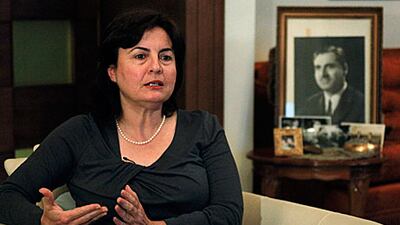ALEY, LEBANON // On a warm May afternoon last year, Shibli Al Ayssami left his house in the Lebanese mountain town of Aley and set off on his daily stroll.
The plan was to walk an hour-long route along the winding country lanes to the home of his daughter, Rajaa Sharafeddine. He never made it.
Eight months later, the 88-year-old Syrian dissident is still missing.
But, his family said they know where he is and who is responsible.
"Everybody knows that the Syrians took him, but there is no material evidence to prove it," said Mrs Sharafeddine, sitting in the living room of her apartment overlooking the Aley hills.
"Yes, of course, I believe he is in Syria." a 53-year-old mother of three.
Mr Al Ayssami is one of several Syrians who have gone missing in Lebanon in the past year and whose disappearances remain unsolved. Syria has denied involvement. But the apparent kidnappings have raised fears about the Syrian regime's reach inside Lebanon.
Opposition activists believe a dozen Syrian nationals have been kidnapped in Lebanon in the past 12 months.
Human Rights Watch has documented cases involving four individuals, including Mr Al Ayssami. Nadim Houry, the international rights group's Beirut director, said he believed the main issue has been an almost systemic reluctance on the part of the Lebanese judiciary to prosecute crimes that appear to be politically motivated.
"What we do know is that the Lebanese judiciary is failing in investigating these cases," said Mr Houry.
"This is not necessarily a government issue of [the governing coalition] March 8 versus [the opposition alliance] March 14. It is an institutionalised unwillingness of the state and the judiciary that goes into deep freeze the second the motivation for any crime is suspected to be political."
Although Syrian troops left Lebanon in 2005, the country still wields significant influence over its smaller neighbour.
The March 8 coalition is led by Hizbollah, a group that remains a staunch ally and protege of the Syrian government. On the other side of Lebanon's political divide, members of the March 14 bloc have spoken out in support of the uprising that began in March last year to bring down the Damascus regime.
In October, a detailed report by Lebanon's police chief, Major General Achraf Rifi, that was leaked to the media, drew links between the kidnapping of Mr Al Ayssami and the disappearance of three Syrian brothers.
The controversial report implicated Lebanese police with ties to the Syrian Embassy in Beirut.
While investigations continue, little progress has been made in either case.
The Jassem brothers disappeared in February last year, a couple of weeks before anti-government protests started in Syria. One of the brothers was seen distributing leaflets in Beirut against the Syrian regime. He was arrested soon after, before the other two disappeared.
The case of Mr Al Ayssami, a member of Syria's Druze minority, is more confounding.
While he was one of the founders of the Baath party, and a former Syrian vice-president, his family said he had not been involved in politics since the early 1990s.
He also had not stepped foot inside Syria since 1966. He went into exile after President Bashar Al Assad's father, Hafez Al Assad, with whom he had political differences, came to power.
Mr Al Ayssami fled to live in Iraq and Egypt, before later dividing his time between family in Washington and Lebanon.
"It's very strange to target an old man, it's like holding a resentment from a long time ago," Mrs Sharafeddine said.
"He was not active in politics, not at all. He got tired of politics. But of course he was happy [about the uprising]. He always believed that the people would change."
After he was taken on May 24 - just five days after he and his wife Maisa arrived to Lebanon from the US - three people said they had seen vehicles with blacked-out windows driving around Aley's rural roads.
One month after the kidnapping another witness came forward to say he had seen Mr Al Ayssami bundled into one of the cars, just 100 metres from Mrs Sharafeddine's home.
The family were also told that on the day he disappeared, three cars matching the description of the vehicles seen in Aley, crossed the border into Syria.
Beyond trickles of information, including from contacts inside Syria - who two months ago said he was still alive in prison - the Al Ayssami family have little to go on.
With the investigation in Lebanon stalled, the family is now seeking international help to free him, while continuing to push the case locally. They have hired a UK-based lawyer and are appealing to the United Nations, as well as Arab and western diplomatic missions.
"We feel international pressure is the only way they can release my father," said Mrs Sharafeddine.
"I knew where my father is from the beginning, so I don't care about the tool who has taken him, I know who gave the orders. When somebody cuts my hand with a knife, I'm not going to blame the knife. I blame the man."

